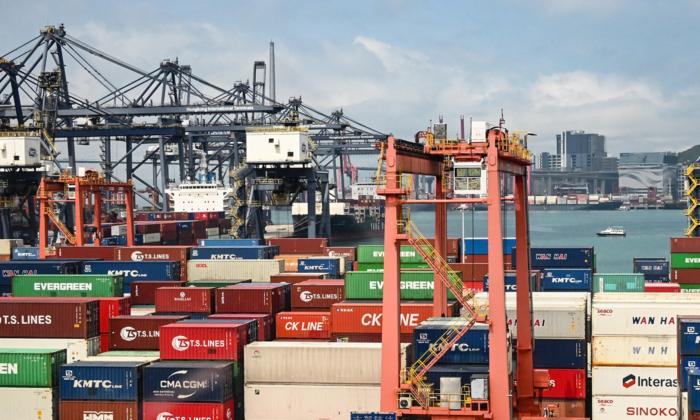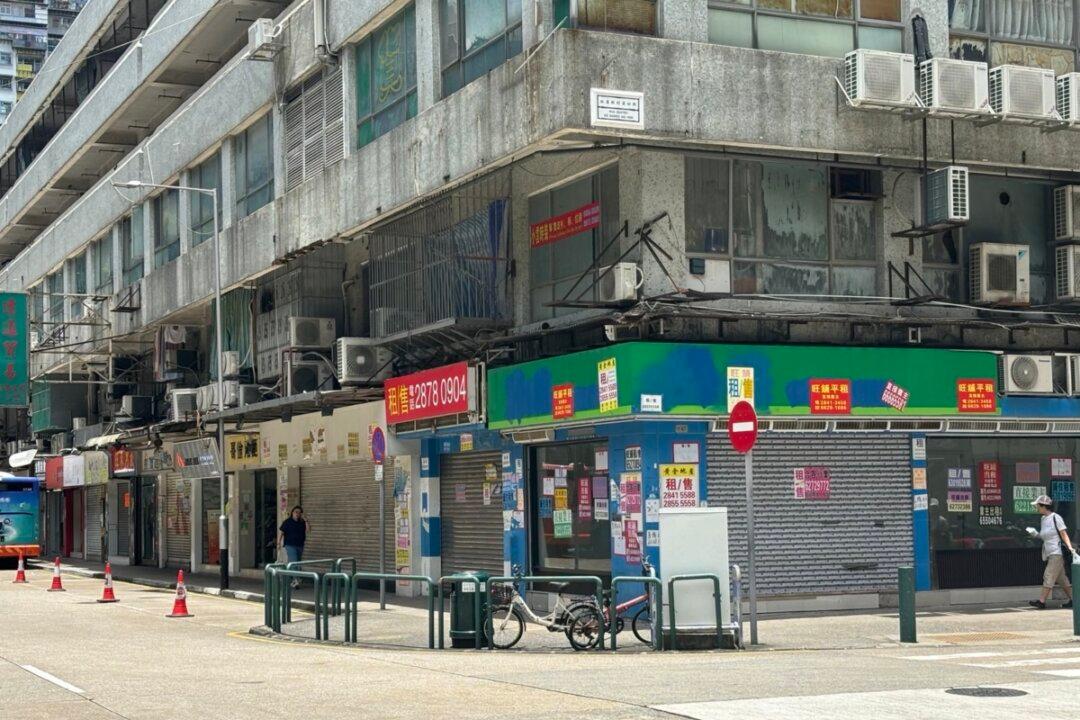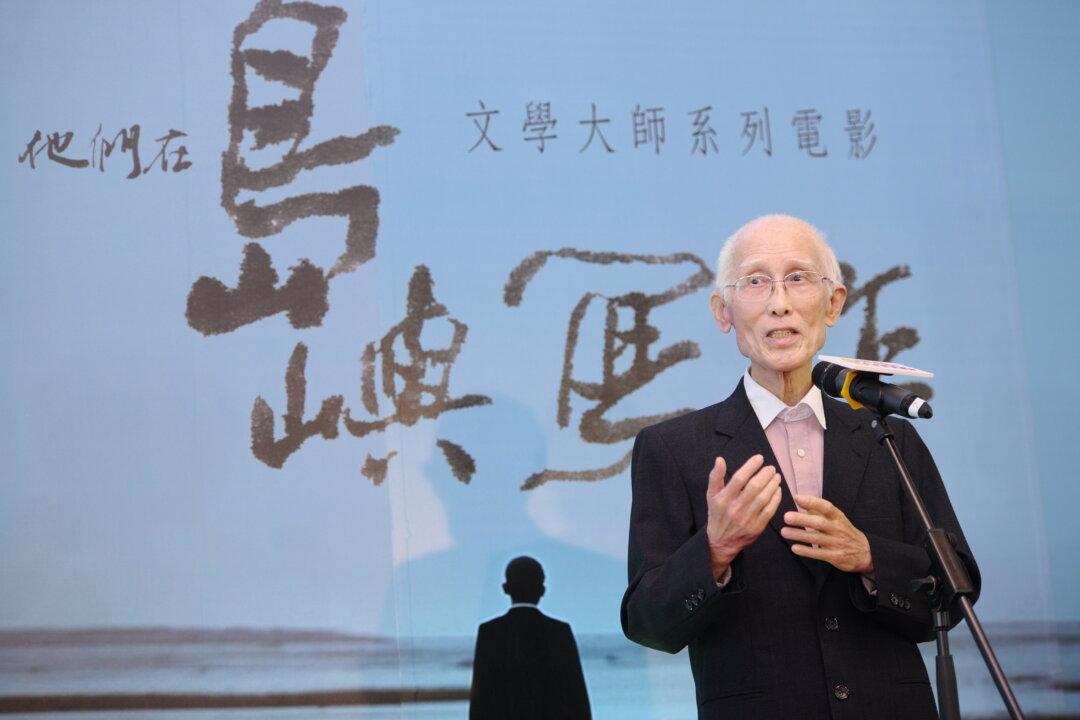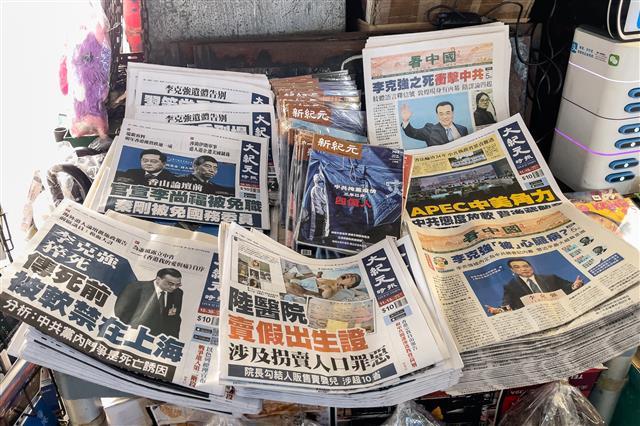According to latest trade figures released by the Hong Kong Census and Statistics Department (C&SD) in May, Hong Kong’s exports have fallen for 13 consecutive months, the longest period of decline in history. Even though the border between China and Hong Kong resumed full opening at the beginning of 2023, throughput through Kwai Tsing Container Terminal (previously known as Kwai Chung Container Port/Terminals), which accounts for 70 percent of Hong Kong’s cargo shipment, has fallen for the 18th consecutive month and the drop in the past two months was nearly 20 percent.
Exports Fell 15.6 Percent Year-On-Year in May
Hong Kong’s exports have fallen for 13 consecutive months, the longest period of decline in history.The C&SD released the latest trade figures on June 27. Hong Kong recorded a trade deficit of HK$26.4 billion (US$3.4 billion) in May, compared with a deficit of HK$36.6 billion (US$4.7 billion) in April. Among the trade data, exports in May fell by 15.6 percent year-on-year, worse than the 11.1 percent forecast earlier, and for last month it was 13 percent. Imports fell by 16.7 percent year-on-year, which was also worse than expected, falling for 11 consecutive months, the corresponding figure last month was a year-on-year decline of 11.9 percent.
Container Throughput at Kwai Tsing Container Terminals Still Plummets
There was much fanfare at the beginning of January this year when Hong Kong and the mainland resumed full quarantine-free border openings, something the market looked forward to seeing, for Hong Kong to regain its international trading edge.However, in the first five months of this year, throughput at the Kwai Tsing Container Terminal, which accounts for 70 percent of Hong Kong’s cargo volume, did not increase. Instead, it has dropped nearly 20 percent in the past two months, falling below the level of handling one million standard containers each month.
According to the Hong Kong Maritime and Port Board, throughput at the Kwai Tsing Container Terminal has fallen for 18 consecutive months, the longest decline on record. It fell by 11.7 percent last year, the highest since the financial tsunami.
Some industry insiders said that Hong Kong is “losing its role as an entrepôt” since the second half of last year, as this year does not show optimism.
Kwai Tsing Container Terminal was the busiest container port in the world from 1992 to 2004. But throughput has been declining since 2005.
HKTDC Revises Export Growth Forecast for This Year
Gary Ng Cheuk-yan, senior economist of Natixis Asia Pacific, said that due to the weaker demand in the expected recovery in the mainland, and as a large part of Hong Kong’s exports are electronic parts and products, the current high-interest rate environment is driving down the global demand for those products, which together have put pressure on Hong Kong’s imports and exports. These factors will likely prevail for the June figures when exports are expected to post another double-digit decline.Production Bases of Major Foreign Companies Leaving Mainland China
Major international companies have relocated their production sites away from the mainland, and Hong Kong’s role as an entrepôt has been undermined as a result.Multiple factors such as geopolitics, the CCP’s crackdown and censorship of foreign companies, and the opacity of the CCP’s policies have led companies to reassess their dependence on China. Industry leaders such as Apple, TSMC, and Mazda, among others, are diversifying their supply chains and gradually moving out of China.
In July 2018, with the start of the trade war between the United States and China, the epoch of globalization and integrated supply chains that ushered in the China era began to crack. In the past three years, the CCP’s implementation of a strict zero-COVID policy had caused investors to reassess their geopolitical risks. In addition, the current Biden administration has accelerated the decoupling of US-China trade. From the chip war to the tensions between the CCP and Taiwan, the Biden administration has pursued an economic security agenda.
Hong Kong’s Entrepôt Role Gradually Shifted to Mainland Cities
Radio Free Asia (RFA) published an article by Ngan Po-kong, former head of the Hong Kong Cable Business Channel. The article stated that Hong Kong’s status as a shipping and trading center is gradually declining, and even its former status as an important entrepôt may be wiped out. For example, he said that Hong Kong United Dockyard Limited, under Li Ka-shing’s CK Hutchison Holdings Limited, has applied to the city’s planning department to change the use of the entire dockyard site together with the surrounding land to build more than 15,000 residential units and a yacht club, reflecting the gloomy outlook Li’s group has for the future viability of Hong Kong’s port. If realized, we cannot rule out the possibility that all of Hong Kong’s port facilities will be gradually transferred to mainland China, with the loss of autonomy forever.The article commented that Hong Kong’s role as a cargo exporter is gradually “shifting toward China.” And what really is behind it is not what the government spokesperson mentioned as the deterioration of the external environment, but in fact, it is Hong Kong’s gradual loss in its former role as a “super entrepôt.” Without it, Hong Kong’s economy can rely on internal consumption alone. That makes Paul Chan Mo-po, the financial secretary, revise his growth forecast, and openly admit that it is an uphill battle to achieve a growth rate of 3.5-5.5 percent for the whole year.




